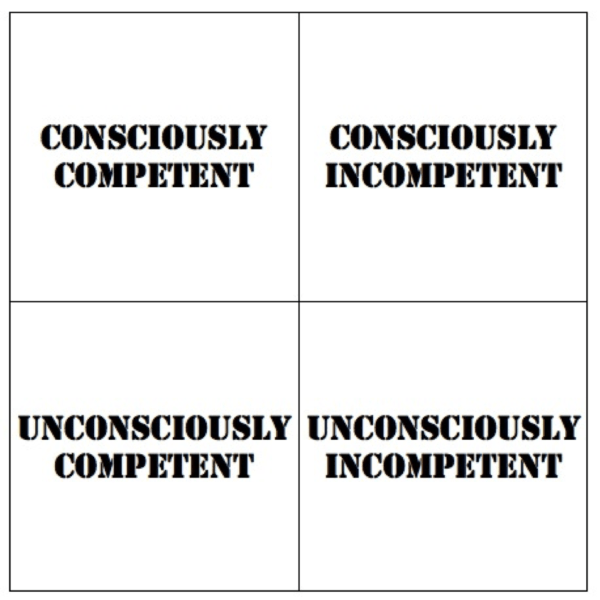Context is critical, but we often forget about it.
Here is why context is so important! When you first meet someone, do you rush to judgment and decide how competent she is? And if you are proven correct, do you generalize her behavior for all circumstances? And do you use the same decision-making process for businesses? If you do, you are making such a big mistake!
When we think about people’s skills and interests and business’ capabilities, we must remember that on any specific topic or subject, each person or business falls within one of the quadrants on this matrix:

Now let’s define, by example, each quadrant:
Consciously Competent – we (the person or business) know what we know. We know that with certainty when we say we are experts in something. For example, last year, my wife needed carpel tunnel surgery on her right hand. Her regular physician recommended a surgeon who impressed my wife and, less importantly, me. As we talked on the first visit, I noticed her name and title embroidered on her smock – the position was “Director of Upper Body Extremity Surgery.” It sounded important, so I, naturally, asked what upper body extremities are, and she said “hands”- duh! So I quickly retorted, “Do you do right or left hands?” She replied, quite seriously, “Both, but I have some associates who specialize in only one.” These people and my wife’s surgeon are consciously competent, and her surgery was quick, painless, and accomplished exactly what she needed.
Consciously Incompetent – we know what we don’t know. For example, Middlesex Consulting specializes in working with B2B clients; I know retention is a universal need, and the basic concepts are the same. However, the B2C world deals in different volumes, scopes, and values and has its terminology. When I am asked to discuss a B2C engagement, I explain that I can start the prospects down the road to growth and retention, but at some time, they will need an expert in their specific field. Sometimes, they want me to do my thing, and they provide the expertise that I am missing, and sometimes we shake hands and go our separate ways.
Unconsciously Competent – we don’t know what we know. While this sounds strange, it happens to all of us. We read books and magazines, watch various topics on television, follow engaging but off-track blogs, and generally have a series of life experiences that qualify us at some level. I know I will never be able to perform upper body extremity surgery. Still, recently, a friend of mine talked to me about his upcoming carpel tunnel surgery, and I was able to answer many of his questions and brief him about what he would encounter during his process. Of course, it was easy for me since he took my recommendation and used the same surgeon as my wife. The point is that I would never have thought that I could offer helpful pre-surgery information until he asked, and then the floodgates opened.
Unconsciously Incompetent – we don’t know what we don’t know. This is scary because we (or they) think we know something and proceed to give advice or answer questions with full conviction and authority and are wrong. The simplest example is when asking a stranger for directions (maybe your GPS is home, or there is no place to pull over and set it up). Anyway, you pull into a gas station, ask for directions, and get a precise answer from someone who appears positive. You head off, and after a while, there is not even another gas station to stop into and get the correct directions. It’s annoying, but what if you ask for advice about whether to load your 401K up on equities or bonds or whether the car you like will last 150,000 miles?
Why does context matter?
Context matters because you constantly evaluate your employees and want to provide them with new assignments to remain engaged and grow. Or you are selecting suppliers and service providers to help you achieve your MBOs. Or, in real life, you have to choose a new nursery school for your firstborn or a body shop to undo some creative parking by your teenager. In each case, you are responsible for evaluating the other party, determining if they are the one for you, and then moving ahead.
Let me give you a final example. Last year, I needed a carpenter to do some repairs on my home and located a small group who said everything correctly and gave me what I thought was a fair price. When I checked their references, I spoke to someone who praised them for doing what they said they would do, being on time, cleaning up each evening, etc. I felt good, and then he asked me the perfect context question – “will this be outside or inside work?” I answered outside. Why? He said it was good because they are NOT finished carpenters and would not recommend them for finish carpentry like installing trim or building cabinets. I stuck with my choice and was satisfied, but also glad I learned the limits of their competency.
About Middlesex Consulting
Middlesex Consulting is an experienced team of professionals with the primary goal of helping capital equipment companies create more value for their clients and stakeholders. Middlesex Consulting continues to provide superior solutions to meet the needs of its clients by focusing on our strengths in Services, Manufacturing, Customer Experience, and Engineering. If you want to learn more about how we can help your organization learn more about your customers, please get in touch with us or check out some of our free articles and white papers here.

